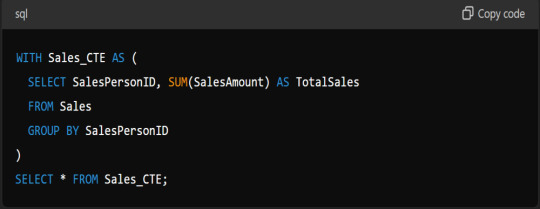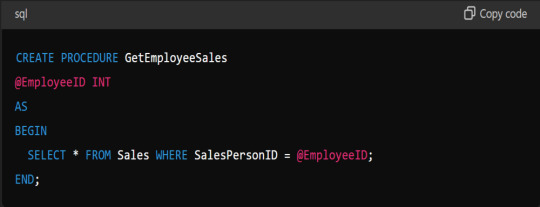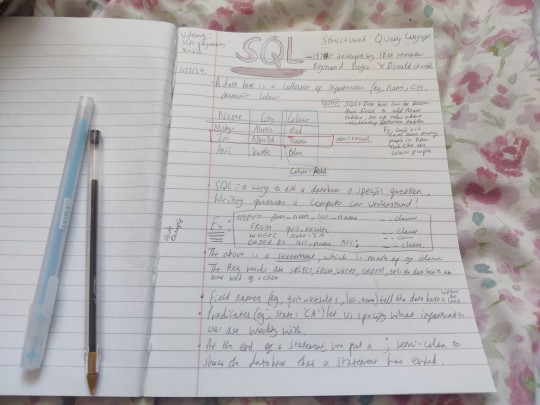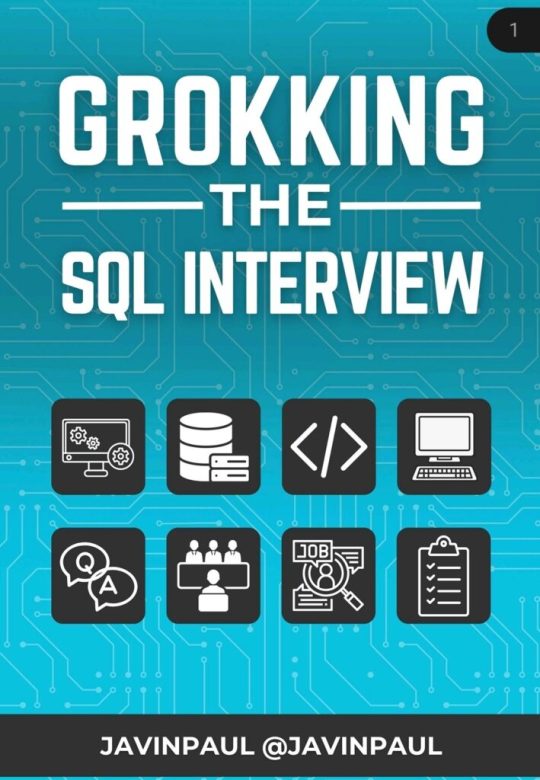#SQL Interview
Explore tagged Tumblr posts
Text
Your Guide To SQL Interview Questions for Data Analyst

Introduction
A Data Analyst collects, processes, and analyses data to help companies make informed decisions. SQL is crucial because it allows analysts to efficiently retrieve and manipulate data from databases.
This article will help you prepare for SQL interview questions for Data Analyst positions. You'll find common questions, detailed answers, and practical tips to excel in your interview.
Whether you're a beginner or looking to improve your skills, this guide will provide valuable insights and boost your confidence in tackling SQL interview questions for Data Analyst roles.
Importance Of SQL Skills In Data Analysis Roles
Understanding SQL is crucial for Data Analysts because it enables them to retrieve, manipulate, and manage large datasets efficiently. SQL skills are essential for accurate Data Analysis, generating insights, and making informed decisions. Let's explore why SQL is so important in Data Analysis roles.
Role Of SQL In Data Retrieval, Manipulation, and Management
SQL, or Structured Query Language, is the backbone of database management. It allows Data Analysts to pull data from databases (retrieval), change this data (manipulation), and organise it effectively (management).
Using SQL, analysts can quickly find specific data points, update records, or even delete unnecessary information. This capability is essential for maintaining clean and accurate datasets.
Common Tasks That Data Analysts Perform Using SQL
Data Analysts use SQL to perform various tasks. They often write queries to extract specific data from databases, which helps them answer business questions and generate reports.
Analysts use SQL to clean and prepare data by removing duplicates and correcting errors. They also use it to join data from multiple tables, enabling a comprehensive analysis. These tasks are fundamental in ensuring data accuracy and relevance.
Examples Of How SQL Skills Can Solve Real-World Data Problems
SQL skills help solve many real-world problems. For instance, a retail company might use SQL to analyse sales data and identify the best-selling products. A marketing analyst could use SQL to segment customers based on purchase history, enabling targeted marketing campaigns.
SQL can also help detect patterns and trends, such as identifying peak shopping times or understanding customer preferences, which are critical for strategic decision-making.
Why Employers Value SQL Proficiency in Data Analysts
Employers highly value SQL skills because they ensure Data Analysts can work independently with large datasets. Proficiency in SQL means an analyst can extract meaningful insights without relying on other technical teams. This capability speeds up decision-making and problem-solving processes, making the business more agile and responsive.
Additionally, SQL skills often indicate logical, solid thinking and attention to detail, which are highly desirable qualities in any data-focused role.
Basic SQL Interview Questions
Employers often ask basic questions in SQL interviews for Data Analyst positions to gauge your understanding of fundamental SQL concepts. These questions test your ability to write and understand simple SQL queries, essential for any Data Analyst role. Here are some common basic SQL interview questions, along with their answers:
How Do You Retrieve Data From A Single Table?
Answer: Use the `SELECT` statement to retrieve data from a table. For example, `SELECT * FROM employees;` retrieves all columns from the "employees" table.
What Is A Primary Key?
Answer: A primary key is a unique identifier for each record in a table. It ensures that no two rows have the same key value. For example, in an "employees" table, the employee ID can be the primary key.
How Do You Filter Records In SQL?
Answer: Use the `WHERE` clause to filter records. For example, `SELECT * FROM employees WHERE department = 'Sales';` retrieves all employees in the Sales department.
What Is The Difference Between `WHERE` And `HAVING` Clauses?
Answer: The `WHERE` clause filters rows before grouping, while the `HAVING` clause filters groups after the `GROUP BY` operation. For example, `SELECT department, COUNT(*) FROM employees GROUP BY department HAVING COUNT(*) > 10;` filters departments with more than ten employees.
How Do You Sort Data in SQL?
Answer: Use the `ORDER BY` clause to sort data. For example, `SELECT * FROM employees ORDER BY salary DESC;` sorts employees by salary in descending order.
How Do You Insert Data Into A Table?
Answer: Use the `INSERT INTO` statement. For example, `INSERT INTO employees (name, department, salary) VALUES ('John Doe', 'Marketing', 60000);` adds a new employee to the "employees" table.
How Do You Update Data In A Table?
Answer: Use the `UPDATE` statement. For example, `UPDATE employees SET salary = 65000 WHERE name = 'John Doe';` updates John Doe's salary.
How Do You Delete Data From A Table?
Answer: Use the `DELETE` statement. For example, `DELETE FROM employees WHERE name = 'John Doe';` removes John Doe's record from the "employees" table.
What Is A Foreign Key?
Answer: A foreign key is a field in one table that uniquely identifies a row in another table. It establishes a link between the two tables. For example, a "department_id" in the "employees" table that references the "departments" table.
How Do You Use The `LIKE` Operator?
Answer: SQL's `LIKE` operator is used for pattern matching. For example, `SELECT * FROM employees WHERE name LIKE 'J%';` retrieves all employees whose names start with 'J'.
Must Read:
How to drop a database in SQL server?
Advanced SQL Interview Questions
In this section, we delve into more complex aspects of SQL that you might encounter during a Data Analyst interview. Advanced SQL questions test your deep understanding of database systems and ability to handle intricate data queries. Here are ten advanced SQL questions and their answers to help you prepare effectively.
What Is The Difference Between INNER JOIN And OUTER JOIN?
Answer: An INNER JOIN returns rows when there is a match in both tables. An OUTER JOIN returns all rows from one table and the matched rows from the other. If there is no match, the result is NULL on the side where there is no match.
How Do You Use A Window Function In SQL?
Answer: A window function calculates across a set of table rows related to the current row. For example, to calculate the running total of salaries:

Explain The Use Of CTE (Common Table Expressions) In SQL.
Answer: A CTE allows you to define a temporary result set that you can reference within a SELECT, INSERT, UPDATE, or DELETE statement. It is defined using the WITH clause:

What Are Indexes, And How Do They Improve Query Performance?
Answer: Indexes are database objects that improve the speed of data retrieval operations on a table. They work like the index in a book, allowing the database engine to find data quickly without scanning the entire table.
How Do You Find The Second-highest Salary In A Table?
Answer: You can use a subquery for this:
What Is A Subquery, And When Would You Use One?
Answer: A subquery is a query nested inside another query. You use it when you need to filter results based on the result of another query:

Explain The Use Of GROUP BY And HAVING Clauses.
Answer: GROUP BY groups rows sharing a property so that aggregate functions can be applied to each group. HAVING filters groups based on aggregate properties:

How Do You Optimise A Slow Query?
Answer: To optimise a slow query, you can:
Use indexes to speed up data retrieval.
Avoid SELECT * by specifying only necessary columns.
Break down complex queries into simpler parts.
Analyse query execution plans to identify bottlenecks.
Describe A Scenario Where You Would Use A LEFT JOIN.
Answer: Use a LEFT JOIN when you need all records from the left table and the matched records from the right table. For example, to find all customers and their orders, even if some customers have no orders:

What Is A Stored Procedure, And How Do You Create One?
Answer: A stored procedure is a prepared SQL code you can reuse. It encapsulates SQL queries and logic in a single function:

These advanced SQL questions and answers will help you demonstrate your proficiency and problem-solving skills during your Data Analyst interview.
Practical Problem-Solving Scenarios SQL Questions
In SQL interviews for Data Analyst roles, you’ll often face questions that test your ability to solve real-world problems using SQL. These questions go beyond basic commands and require you to think critically and apply your knowledge to complex scenarios. Here are ten practical SQL questions with answers to help you prepare.
How Would You Find Duplicate Records In A Table Named `Employees` Based On The `Email` Column?
Answer:
Write A Query To Find The Second Highest Salary In A Table Named `Salaries`.
Answer:

How Do You Handle NULL Values In SQL When Calculating The Total Salary In The `Employees` Table?
Answer:

Create A Query To Join The `Employees` Table And `Departments` Table On The `Department_id` And Calculate The Total Salary Per Department.
Answer:
How Do You Find Employees Who Do Not Belong To Any Department?
Answer:
Write A Query To Retrieve The Top 3 Highest-paid Employees From The `Employees` Table.
Answer:
How Do You Find Employees Who Joined In The Last Year?
Answer:
Calculate The Average Salary Of Employees In The `Employees` Table, Excluding Those With A Wage Below 3000.
Answer:
Update The Salary By 10% For Employees In The `Employees` Table Who Work In The 'Sales' Department.
Answer:
Delete Records Of Employees Who Have Not Been Active For The Past 5 years.
Answer:
These questions cover a range of scenarios you might encounter in an SQL interview. Practice these to enhance your problem-solving skills and better prepare for your interview.
Tips for Excelling in SQL Interviews
Understanding how to excel in SQL interviews is crucial for aspiring data professionals, as it showcases technical expertise and problem-solving skills and enhances job prospects in a competitive industry. Excelling in SQL interviews requires preparation and practice. Here are some tips to help you stand out and perform your best.
Best Practices for Preparing for SQL Interviews
Preparation is critical to success in SQL interviews. Start by reviewing the basics of SQL, including common commands and functions. Practice writing queries to solve various problems.
Ensure you understand different types of joins, subqueries, and aggregate functions. Mock interviews can also be helpful. They simulate the real interview environment and help you get comfortable answering questions under pressure.
Resources for Improving SQL Skills
Knowing about resources for improving SQL skills enhances data management proficiency and boosts career prospects. It also facilitates complex Data Analysis and empowers you to handle large datasets efficiently. There are many resources available to help you improve your SQL skills. Here are a few:
Books: "SQL For Dummies" by Allen G. Taylor is a great start. "Learning SQL" by Alan Beaulieu is another excellent resource.
Online Courses: Many websites offer comprehensive SQL courses. Explore platforms that provide interactive SQL exercises.
Practice Websites: LeetCode, HackerRank, and SQLZoo offer practice problems that range from beginner to advanced levels. Regularly solving these problems will help reinforce your knowledge and improve your problem-solving skills.
Importance of Understanding Business Context and Data Interpretation
Understanding the business context is crucial in addition to technical skills. Employers want to know that you can interpret data and provide meaningful insights.
Familiarise yourself with the business domain relevant to the job you are applying for. Practice explaining your SQL queries and the insights they provide in simple terms. This will show that you can communicate effectively with non-technical stakeholders.
Tips for Writing Clean and Efficient SQL Code
Knowing tips for writing clean and efficient SQL code ensures better performance, maintainability, and readability. It also leads to optimised database operations and easier collaboration among developers. Writing clean and efficient SQL code is essential in interviews. Follow these tips:
Use Clear and Descriptive Names: Use meaningful names for tables, columns, and aliases. This will make your queries more straightforward to read and understand.
Format Your Code: Use indentation and line breaks to organise your query. It improves readability and helps you spot errors more easily.
Optimise Your Queries: Use indexing, limit the use of subqueries, and avoid unnecessary columns in your SELECT statements. Efficient queries run faster and use fewer resources.
Common Pitfalls to Avoid During the Interview
Knowing common interview pitfalls is crucial to present your best self and avoid mistakes. It further increases your chances of securing the job you desire. Preparation is key. Here's how you can avoid some common mistakes during the interview:
Not Reading the Question Carefully: Ensure you understand the interviewer's question before writing your query.
Overcomplicating the Solution: Start with a simple solution and build on it if necessary. Avoid adding unnecessary complexity.
Ignoring Edge Cases: Consider edge cases and test your queries with different datasets. It shows that you think critically about your solutions.
By following these tips, you'll be well-prepared to excel in your SQL interviews. Practice regularly, use available resources, and focus on clear, efficient coding. Understanding the business context and avoiding common pitfalls will help you stand out as a strong candidate.
Read Further:
Advanced SQL Tips and Tricks for Data Analysts.
Conclusion
Preparing for SQL interviews is vital for aspiring Data Analysts. Understanding SQL fundamentals, practising query writing, and solving real-world problems are essential.
Enhance your skills using resources such as books, online courses, and practice websites. Focus on writing clean, efficient code and interpreting data within a business context.
Avoid common pitfalls by reading questions carefully and considering edge cases. By following these guidelines, you can excel in your SQL interviews and secure a successful career as a Data Analyst.
#sql interview questions#sql tips and tricks#sql tips#sql in data analysis#sql#data analyst interview questions#sql interview#sql interview tips for data analysts#data science#pickl.ai#data analyst
1 note
·
View note
Text
me because i'm unemployed and crazy: “here's a worksheet where you can see what the rally people do before they started their career fulltime !”
only get my hands on info of like 50 people and also the numbers are heavily skewed towards finns and frenchies. because .. duhh
charts breakdown part ! (this is just a part where i yap)

unsurprisingly many drivers had a career right in motorsports or some motorsports-related jobs like mechanics/engineers (started driving at a very young age, too). but also there's quite a portion of them studied law or practiced law previous to making a career out of racing. maybe driving 125km/h is the perfect way of destressing after memorising 300 lines of civil law 🙏
now about co-drivers. most of them studied engineering or even had really successful corporate jobs. like jonne halttunen is literally a ceo and he prolly has enough money to provide for kalle for the rest of his life lol. besides that we have the sportsplayers who switched over after some injury (enni included) or the military people - tina thörner was one of the first women to make it into the swedish air force and guy frequelin was a tank driving instructor ! so basically co-drivers be having the craziest sidejobs ever…

now since i have the most data for finland and france: voilà! comparison chart ! (co-drivers included)
apparently finns (and drivers in nordic countries) can have a professional rallying career at a very early age - usually they do this with external funding or working as a developer/driving instructor for car manufacturers. meanwhile most frenchies dabbled in a lot of jobs or struggled financially before they can have a full-time seat.
#the collecting info part is ok. but why tf do i have to learn sql to make the chart#also during this i found out actually the old finns are not in hiding. they actually yap a lot in podcasts and interviews#we just need to listen to them. in finnish …#also ilkka is a principal of a national coaching program for codrivers lol. what do you think abt running for fia presidency ilkka …#random banter
22 notes
·
View notes
Text
MOCK INTERVIEW DONE.

I was having a heart attack when it first started but I calmed down a lot at the end !!!!
I did well with technical questions, just got 2 I need to review, I did good !
My biggest feedback was that I was leaving everything too vague and general which forced the interviewers to ask a lot more questions than they wanted. I agree honestly,,,why did I think my answers were acceptable in length 🧍🏻
Both for technical and soft skill questions, I just didn’t provide enough details because I was afraid to bore and overwhelm them. But this fucked me over hahhhh🏌️
Gotta learn when to elaborate and when to stop, seems a bit hard. I’ll work on it.
I was told I did well and that I had a nice attitude, and I should focus on being more specific with answers. I was expecting to get really discouraged so being technically decent and the nice useful feedback was uplifting.
I’ll start applying for real in a couple of days so this was real useful. Got the experience without any consequences
18 notes
·
View notes
Text
ugh applying to jobs recently has felt like back when i was in college the first time applying to movie theater jobs and getting denied without an interview despite being 19 with 2 years of experience - including managerial experience
#like bruh#now i'm 25#i have 3 years professional design experience (not including any freelance)#I have multiple years of managerial experience#i almost have two (2) bachelor's#i know java; javaScript and python.. I'm learning SQL and C++#i'm sooooo proficient now in illustrator and corelDraw#and i use RhinoCAD regularly#i hate it. but I do use it at least weekly#i have never ONCE not gotten a job offer after an interview#literally i have /never/ not been offered a job if i actually get to the interview stage#furthermore i've had employers literally beg for me to stay#and yet i cannot fucking get an interview to save my life#(altho tbf most of the jobs i'm applying for are above my weight class)#but some of them??#'do you have experience designing graphics for apparel?'#YES. I DID THAT FOR YEARS. LOOK AT MY PORTFOLIO. GIVE ME AN INTERVIEW#lea speaks
2 notes
·
View notes
Text

11/7/24 - I've not got a computer sciences background (I'm a biologist!), but I've been learning the bare basics of SQL for a few days. I've applied to two data tech/analyst apprenticeships so I'm trying to get the basics and prep for interviews like this
#got an interview sooooon#my thoughts are even if i don't do an internship- cos i am a biologist like... running tables with sql and a bit of python is SO HELPFUL#computational biology wooooo#my posts#studyblr#notes#learn to code#coding#sql#programming#udemy
3 notes
·
View notes
Text
the times tables
#have i talked about the time i cheated on my times tables. ok so in 3rd we had a series of times tables tests starting from 0 going to 12#and however many you passed determined what you got for the ice cream party. 0s was ice cream 1s was choccy sauce etc#but the tests were timed so you actually had to know the answers you couldnt just sit there calculating for each answer#so anyway yeah the temptation of a tangible reward and the recognition of my peers got to me and i used a cheat sheet for some of them#idk if it was even worth it... some of the tiers were like chopped nuts or bananas or cherries and i wouldnt have wanted those anyway#well my cheating days are behind me. except for when during my job interview i looked up sql syntax on my phone bc i forgor#like the reason you write that stuff in an editor is so it can tell you when the syntax is wrong. but other than that yeah
0 notes
Text
How SQL Coding Classes Help Developers Work Smarter
Web developers and software engineers can greatly benefit from SQL coding classes. Managing backend systems and working with relational databases are daily tasks in development roles. SQL coding classes teach you how to create, update, and manage data effectively using SQL. You’ll also learn to integrate SQL into apps and understand how database performance affects user experience. With the skills you gain, you’ll write cleaner code and build more efficient software systems that scale easily.
#mysql viva questions#sql basics for interview#sql database for practice#sql coding classes#software testing sql interview questions
0 notes
Text
caught between my cousin didn't get a job right out of college and it didn't kill her 😀 and my cousin went to an Ivy and also still only got the job because of a friend referral 😨
#eggsistential speaks#i have exactly One (1) referral that went anywhere#final interview is tomorrow and im pretty nervous#but also what can i do at this point other than be myself#and i know myself is plenty capable#trying to speedrun brushing up on previous classwork#position desires more tableau and sql but I'm a matplotlib/seaborn and pandas mfer#ive certainly touched both#more certainly sql than tableau#but only through the wonky edpuzzle coding thingy we used for class#eggsistential job hunt crisis#if it doesn't go well I'll make it known#the feeling that since this is my only surviving referral this is my last shot is kinda overwhelming
0 notes
Video
SQL Interview Question: Calculate Total Amount Credited by Each Customer...
1 note
·
View note
Text

what is msbi course , msbi vs power bi Excel in Business Intelligence with our MSBI Certification Training online. Specialized in SSIS, SSAS, SSRS. Elevate your skills for success.
msbi tutorial for beginners , msbi interview questions , what is msbi course , msbi certification training course online ssis ssas ssrs , msbi online course
#msbi tutorial for beginners#msbi interview questions#what is msbi course#msbi certification training course online ssis ssas ssrs#msbi online course#data analytics#msbi#sql#power bi course#power bi course fees#power bi online training#power bi certification#power bi certification cost#education#power bi
1 note
·
View note
Text
Gonna start applying to places very soon,,,, anxious but I gotta put myself out there. Do y’all have any advice regarding interviews ? Technical or non technical. I’m going for a QA position but any advice is welcome
4 notes
·
View notes
Text
#Azure Data Factory#azure data factory interview questions#adf interview question#azure data engineer interview question#pyspark#sql#sql interview questions#pyspark interview questions#Data Integration#Cloud Data Warehousing#ETL#ELT#Data Pipelines#Data Orchestration#Data Engineering#Microsoft Azure#Big Data Integration#Data Transformation#Data Migration#Data Lakes#Azure Synapse Analytics#Data Processing#Data Modeling#Batch Processing#Data Governance
1 note
·
View note
Text
GROKKING THE SQL INTERVIEW
SQL Guide 📚📚Download

View On WordPress
0 notes
Text
A Preparation Guide to SQL Interviews
In today’s increasingly data-driven world, SQL (Structured Query Language) skills are highly valued by employers. To excel in SQL interviews, proper preparation for SQL query interview questions is crucial. This blog post will explore various strategies for effectively preparing for SQL interviews. We will discuss the importance of understanding SQL fundamentals, mastering query optimization…

View On WordPress
0 notes
Text
the very first project i ever worked on in my career was for this bank’s data infrastructure where we had to port some of it over to microsoft azure. what that meant in practice was that i was converting pl/sql queries into ms sql queries all day. i generally used to do around 20 a day for a couple of months and at the time i cursed it for being a tedious job, but the upshot now is that 3 years on i still have a deep fundamental proficiency in sql and it’s something that’s ended up being really useful in my career
#i have an interview tomorrow where sql will probably come up#and i tore through the practice problems i did today for it#moral of the story is that when you do something 5 days a week for a couple of months you become good at it like who knew
0 notes